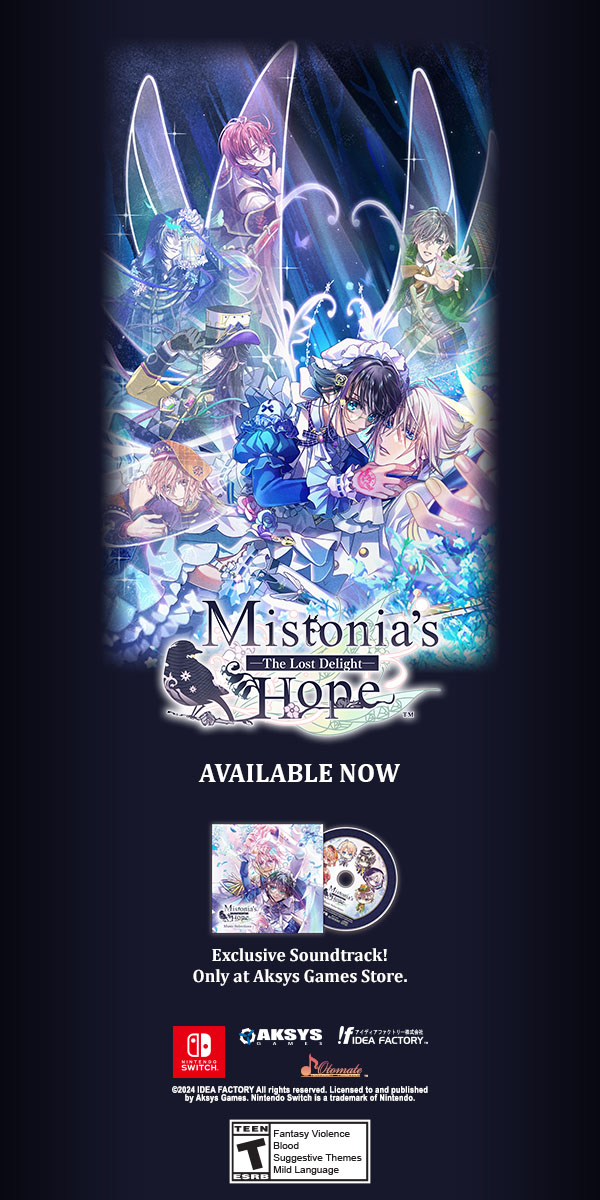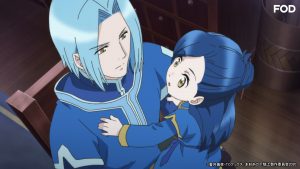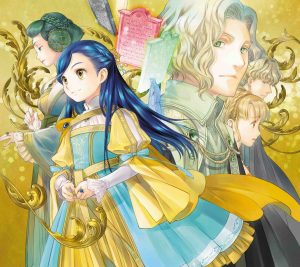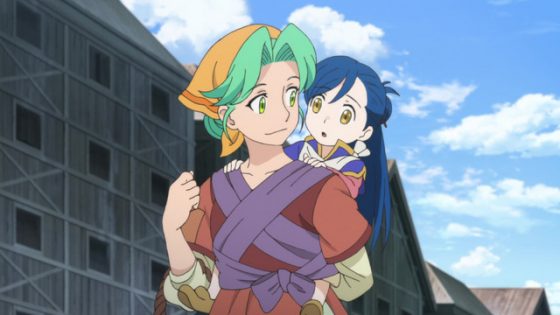
Ascendance of a Bookworm is a role model for contemporary isekai. By taking the convenience out of convention, Bookworm applies convention as a necessity--an integral part of its story.
Despite its laid back atmosphere, Ascendance of a Bookworm addresses critiques on its subgenre with its strong execution. By establishing a premise and a core structure, Bookworm pushes the core idea of isekai, one’s fantasy made reality, without sacrificing a connection with its characters and themes.
A Concern about Isekai:
Ascendance of a Bookworm has a knack for structure. With its purposeful writing, it crafts a story well-aware of its contemporaries. By doing so, Bookworm addresses a common critique: “isekai are self-gratifying and self-fulfilling.”
Before we address how Bookworm handles this, we must first understand this argument. In the previous article, it was stated that isekai protagonists are often given multiple blessings.
However, that hallmark of isekai, the blessing, can prevent proper character development. By giving a character what they want, authors lose an opportunity to show it’s not what a character needs. A chance to develop a character flaw is lost purely by convention. Furthermore, too many blessings have another problem. When a character is given too much power, it becomes difficult to write tension into a story.
Without tension, a story can feel inevitable--characters are simply destined to win. If that’s the case, then no obstacle will ever feel real. In fiction, adversity should not be just a plot point. To do so ignores how it creates a believable story.
Addressing the Critique: Bringing Reality into Fantasy
Making a believable story does have its challenges. Luckily, one of isekai’s greatest assets is that it self-references. If a character comes from Earth, then that invokes a mental image, a familiar setting. It sets up our expectations of a character and their mindset. With Earth as a reference, the author can allude towards real (believable) technology, history, and social concerns.
The Witch of Tata, a light novel that won the Dengeki Taisho award, does exactly that. By transferring an entire class into a new world and creating a documentary-styled story, The Witch of Tata changes the subgenre’s focus from a protagonist to a group.
This enables its critique on the Japanese education system and how it treats creativity--by crushing it. Without going too far into detail, The Witch of Tata takes another hallmark of isekai, people disillusioned with their lives, and implements it gracefully.
As you may have noticed, a common thread found in successful isekai is their awareness and purposeful use of convention. At times, this can lead to a strong message, as is the case with The Witch of Tata.
However, not all stories need a moral, and not all isekai require a message. What is required is a strong premise. In The Anatomy of Story by John Truby, he states that the premise is “your story stated in one sentence. It is the simplest combination of character and plot.” In order to have a proper direction, an author must know their premise.
In The Art of Dramatic Writing by Lajos Egri, the author states “You… should not write anything you do not believe. The premise should be a conviction of your own, so that you may prove it wholeheartedly. Perhaps it is a preposterous premise to me--it must not be so to you… the audience must know what the message is. And whatever it is, you must prove it.”
If a strong premise is a strong conviction, then one could say a strong premise gives a strong purpose. With a strong purpose, the question isn’t whether you believe in your work; it’s whether your audience believes in your work.
To make your audience believe, you must capture the truth. Your characters must be believable, your story immersive, your message proven. Good fiction must reflect reality, regardless of its genre. Even in fantasy there must be reality. Isekai is no exception.
Thus, Ascendance of a Bookworm has a simple premise: a girl goes to another world and learns, not the value of books, but the value of friends and family.
And now it must prove it.
The Poignant Question
Myne is special. Unlike any child, she’s able to best experts at their trade, out whimsy veteran businessmen. She’s created new types of paper, used techniques unseen before, and created popular accessories with original tools. The current Myne is an impossibility: no child could be who she is.
That’s a fact we’ve known since the beginning. Myne has been living in a world unlike her own, and as she’s repeatedly tried (but failed) to live out her own fantasy. In most isekai, the fantasy is in the setting and within the character. Characters want to become the best versions of themselves--to truly be reborn.
However, in Ascendance of a Bookworm, that’s not a reality. It’s the question. If Myne cannot fulfill her desires, if she cannot live a fulfilling life, then what’s the point of her being reborn? She must find out the answer to her question. If not, then her life will just be a lie. If not, then the relationship she’s known was simply a fairy tale.
What is Real: Family, Friends, and Our Emotions
In episode 8, the show tests the extent of Myne and Lutz’s relationship. Lutz asks Myne if she’s an imposter, and she answers, “I don’t mind giving her back, but it’d be better if I did it back home...Because I’m pretty sure only a corpse will remain after I’m gone.” As if giving up, she responds without energy. Lutz’s voice shakes. He questions further, “You mean she’s gone forever? She’s never coming back?!”
“I think so,” she says, her head lowering. Like a sucker-punch, the next shot is from below. The scene continues with Lutz clutching his chest, his emotional pain becoming physical. “Answer me this: did you devour Myne with your fever?”
In contrast to his emotion, she responds almost coldly, “That’s half-right and half wrong. I believe that the real Myne was consumed by her fever, too. But I am not the cause of the fever.”
The next shot has both in the picture: Lutz facing forward and Myne facing down. Without this shot, her contrasting responses could seem apathetic. However, when we see Myne in this scene, her gaze never looks upwards. Her eyes never meet Lutz. Without her body language, we might not understand. With her body language, we start to see that she does feel. However, the problem is Lutz doesn’t see this.
In film, if an audience cannot see a character, it becomes difficult to relate to them. Not seeing a person denies empathy and understanding, and this directing technique is used to influence a viewer’s perception of a character.
Similarly, this strategy can be applied to characters within a story. Lutz and Myne’s perspectives are not aligning. If characters cannot physically see eye-to-eye physically, then it’s impossible for them to see eye-to-eye metaphorically.
After all, to understand and empathize with someone is to see, not who you think they are, but who they truly are. Thus far, that is the ultimate question of the scene and show: who is Myne?
She grips the edge of her dress, “Hell, it’s eating away at me, too” she states. This time, Lutz grips her shoulders and shakes her. “What does that mean?!” By shaking her, Lutz creates eye contact for the first time in this scene, but despite this, he still continues to blame her.
“Didn’t Myne disappear because of you?!” He accuses her, and we see Myne’s eyes widen. “Tell me I’m right!” He probes further. The camera zooms into her eye, and it’s unshaking. She finally reveals her emotion, “It’s not like I wanted to be Myne!” Lutz is taken aback. “I lived and died in a different world, but suddenly I found I’d become some child! If I had the choice, I’d never have picked such a sickly body!”
The music stops. It starts to dawn on Lutz, “You didn’t want to take Myne’s place?” he says. Myne responds, “Would you want to? Her body is so frail, just walking a little leaves it bedridden the next day.” The music starts once more, and Lutz releases his grip--a sign that both the physical and emotional tension has lessened.
Now, Lutz asks a question, not about the original Myne, but about her, “Is that fever gonna eat you alive, just like Myne?” She answers, “Yeah, probably. So if you want me gone, just say so.” Shocked, he questions why she’d say that.
With this, Myne affirms something we’ve known, “I would have been long gone if it wasn’t for you. I fell sick after Mom used my wood tablets as firewood, remember? At that time, I didn’t mind if the fever swallowed me whole. Try as I might, I was never getting my books, so I didn’t care anymore… But then, I saw your face, remembered the promise I made to you, and came back to myself… to introduce you to Otto… I fulfilled my promise… if you want me gone, I’m okay with that.”
Lutz backs down, but a different tension emerges. The camera shifts to his hand as he closes it into a fist. “Since when have you been Myne?” he asks. For about a year is the answer. His head sinks, “The family hasn’t realized?”
“They have noticed that I’m weird, but I don’t think they’ve ever considered that I might not be Myne. Besides, Dad was saying he was happy just seeing how active I’d become.”
“I see,” Lutz responds, turning his back on Myne. He walks a few steps before stating, “I don’t think it’s my place to decide. It should be Myne’s family.” Surprised, Myne answers back, “Are you saying things can stay like this for now? And you’re okay with that… Are you sure you don’t want me gone… I’m not the real Myne.”
The shot switches to her hand. It trembles, barely holding onto his shirt. Noticing this, he turns halfway. “It’s fine,” he says. “It’s not like Myne will come back once you’re gone. Besides… most of my memories with ‘Myne’ are actually of you.”
Aptly, the scene cuts to a flashback of their time together then back to Lutz. He’s no longer half-turned. For the first time in the scene, he sees Myne for who she is. He meets her eye-to-eye and says, “You can still be Myne to me.”
All doubt fades away. Lutz’s words affirm Myne’s place in the world, relinquishing her greatest fear--perhaps the very reason she dove into books in her original life. From this point onwards, her development starts anew. She will learn the value of something more desirable than even her dying wish.
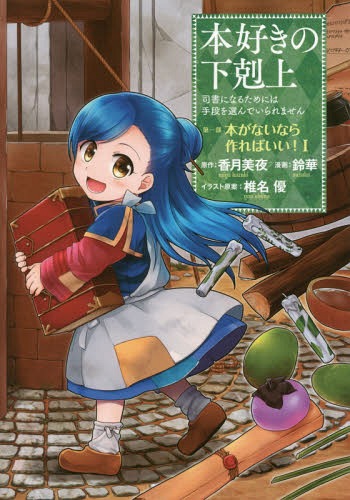
Final Thoughts
It’s not often that isekai protagonists are rejected. Most isekai rely heavily on its protagonist, and by gifting them immense power, they shift the world as if the world was made for them.
However, by focusing too heavily on the protagonist, the supporting cast is neglected. Support characters are more than pieces within a story. With proper interaction, characters leave relationships having learned more than before. Ascendance of a Bookworm understands the value of relationships and turns it into a fundamental part of its writing.
Recommended Post
Things Get More Serious in Ascendance of a Bookworm Season 3
Recommended Post
